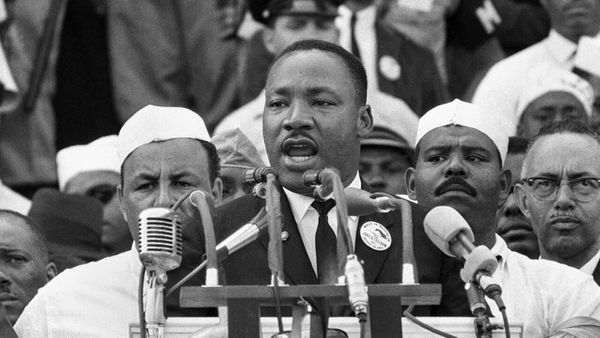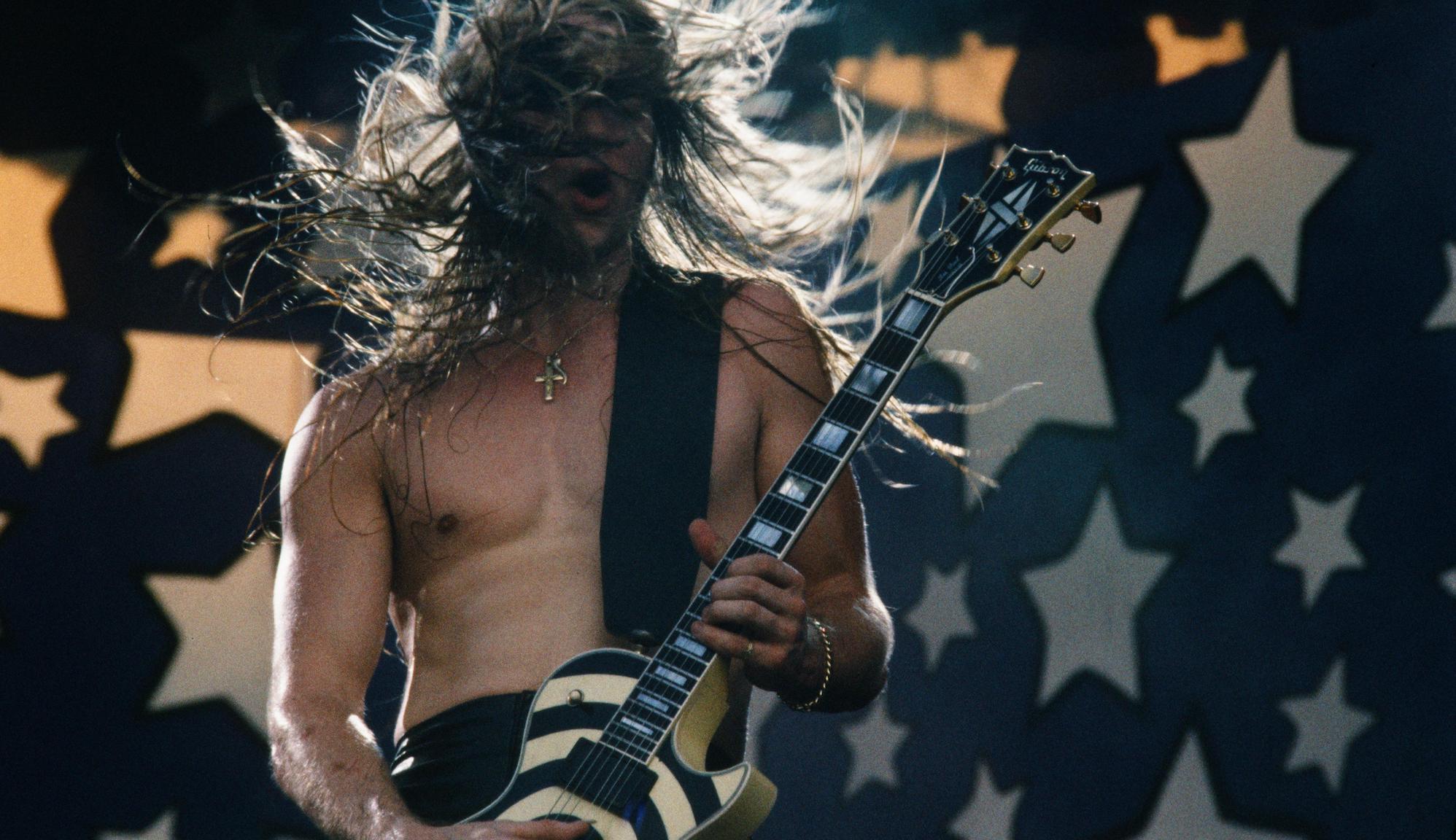
He could easily be intimidated, following in the footsteps of guitarists with names like Iommi, Rhoads, and Lee. But Ozzy Osbourne’s Zakk Wylde is his own man… and already proving it.
Much has happened to Zakk Wylde during the past year. Besides co-writing all eight tunes on his vinyl debut and touring the world behind it, the young New Jersey hotshot established a tight bond and rapport with vocalist Ozzy Osbourne that is sure to boost his performance the next time they record.
Though the current No Rest For the Wicked doesn’t entirely convey Wylde’s full potential, it’s still a fine introduction to a promising player.
The wicked wah-wah inversions of Miracle Man and the fretboard-shattering hot licks of Devil’s Daughter are enough to provide clear evidence that Wylde is a man of guitar destiny.
“Ozzy didn’t want my playing to be too over the top,” says Wylde. “I didn’t know him that well as a person when we recorded the album, and I couldn’t force him to accept all my ideas. He didn’t want me to play very fast on every cut. Not that I would’ve – there’s too many guitarists doing that trip nowadays – but I really wanted to play a lot more on the album.
“The thing is, Ozzy’s been rocking out since before I was born, so I had to respect his opinion as to what would work in the studio. He just wanted me to be the best musician possible. When he auditioned guitar players, his big gripe was that most everyone played like Yngwie Malmsteen on acid, and that wasn’t what he wanted.
“Everything happened so fast for me,” admits Wylde, who just turned 22 this past January. “Black Sabbath are my all-time favorite band and I’m Ozzy’s biggest fan. When I would think about that when recording, it held me back. I didn’t play to the best of my potential, but I’m still happy with how the album turned out.”
Instead of relying on flash-happy fretwork – an excess common among young players – Wylde gears his guitar work to meet with the songs’ requirements. Whether wailing furiously or pounding out thick rhythmic slabs over a throbbing backbeat, Wylde obviously has what it takes to play guitar with Ozzy.
“What I like to play nowadays is straight-out pentatonic licks,” he says. “I listen to a lot of new stuff, and it’s such a bore hearing someone just play fast diatonic scales. They usually end up sounding too much like Yngwie.
How can you top what Yngwie's doing? Play it faster? That's like some guy playing Eruption faster
“I was so into Yngwie when he was in Alcatrazz,” admits Wylde. “I remember saying, ‘That guy wails. I've got to learn those licks.’ But then I realized I'd be better off playing something different, because I knew it would be too hard to top, and I didn't want to be compared to him.
“Guitar players should put their egos away at times,” he advises. “A lot of fast guys who get compared to Yngwie brag and say stuff like, ‘Hey man, I was playing like this five years before Yngwie came out.’ I say to them, ‘Big deal. What are you gonna do, send out flyers?’
“They have an ego thing of trying to play the fastest scales instead of doing something that doesn't sound like anyone else. I know Yngwie may not have been the first to play like that – he's integrated the styles of players like Ulrich Roth, Al Di Meola, and Ritchie Blackmore into his own trip – but he's the guy you get compared to.
“So, how can you top what he's doing? Play it faster? That's like some guy playing Eruption faster. I mean, could you bore me some more? Eddie Van Halen already mastered the finger-tapping technique, so it would be very hard to do it better. It's such a definitive style, that Eddie's the first guy you think of when you hear someone play like that, just as Yngwie's the first guy you think of when you hear super-fast classical licks.
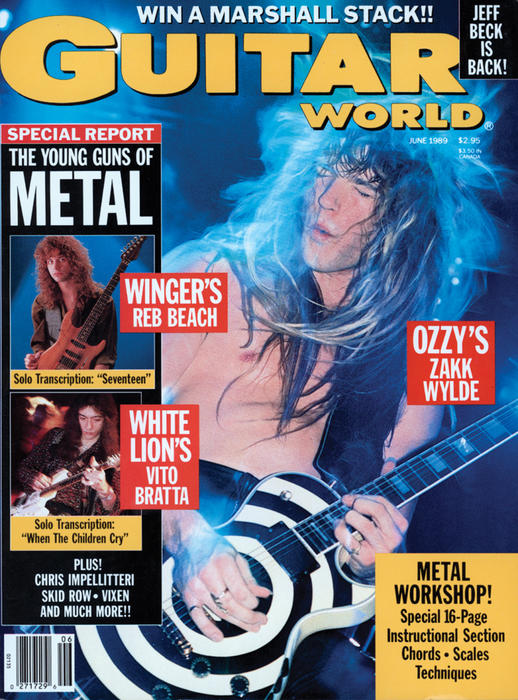
“Like Yngwie,” he continues, “I was also heavily into Al Di Meola. I put a lot of effort into learning the licks from his Elegant Gypsy and Land Of The Midnight Sun albums when I was seventeen, because I wanted to do the Di Meola trip in a rock context. But as soon as I heard that someone else was doing it, I immediately branched into other areas.”
Wylde often combines chicken pickin' with crunching distortion in a style that will eventually distinguish him from other players.
I don't think Ozzy will ever say to the crowd, ‘No chicken pickin' allowed tonight’
“I'm not breaking any new ground yet,” he admits, “but hopefully on the next album I will. I don't think anyone else is doing chicken pickin' in a metal band. I want it to be my trademark, and I'll be doing more of it on the next album.
“I do it on stage now,” he adds. “I don't think Ozzy will ever say to the crowd, ‘No chicken pickin' allowed tonight.’
“I remember telling my friends that I wanted to play some country-type licks onstage with Ozzy, and they'd say, ‘I don't think the kids are ready for your chicken pickin' – you'll get bottled.’ But it hasn't happened yet.
“The thing is, once I'm blaring through loud amps, I ain't gonna sound like Albert Lee. I tried to explain that to Ozzy when we were doing the album, but he wouldn't listen to me. I also wanted to play more slide guitar and use the wah pedal more. But the minute Ozzy hears a wah-wah, he immediately thinks of Jimi Hendrix. I could be playing Mary Had A Little Lamb with a wah-wah, and he'd be going, ‘Hendrix, Hendrix, Hendrix.’”
Wylde has come a long way for someone who's been playing guitar for only seven years. His first instructor was Leroy Wright, his football coach's Les Paul-toting son.
“Leroy had long hair and a Harley-Davidson,” remembers Wylde, “so I thought he was really cool.
“As soon as he got me going on guitar, I got so into it that I no longer wanted to pursue a career in football. He taught me the stuff he grew up on – Frank Marino, Hendrix, [Robin] Trower, players like that – but when I saw an Albert Lee videotape, I ripped off every lick on it.
“Leroy got my ear in tune, taught me diatonic and pentatonic scales and how to change keys. He eventually suggested that I take classical lessons and sent me to a guitar teacher in Freehold [New Jersey]. After that I took lessons from this guy in Manhattan who studied with Christopher Parkening.
“I took classical lessons because I wanted to play something really hard on guitar," elaborates Wylde.
“Every time I'd go into my local music store, these jazz-heads would be behind the counter. They had such closed minds, they didn't like any of the rock licks I'd play. I thought, ‘I'll learn something so hard, they'll never be able to play it.’ It was very challenging. The more I played it, the more I liked it. Once you know counterpoint and theory, it automatically improves your songwriting ability.”
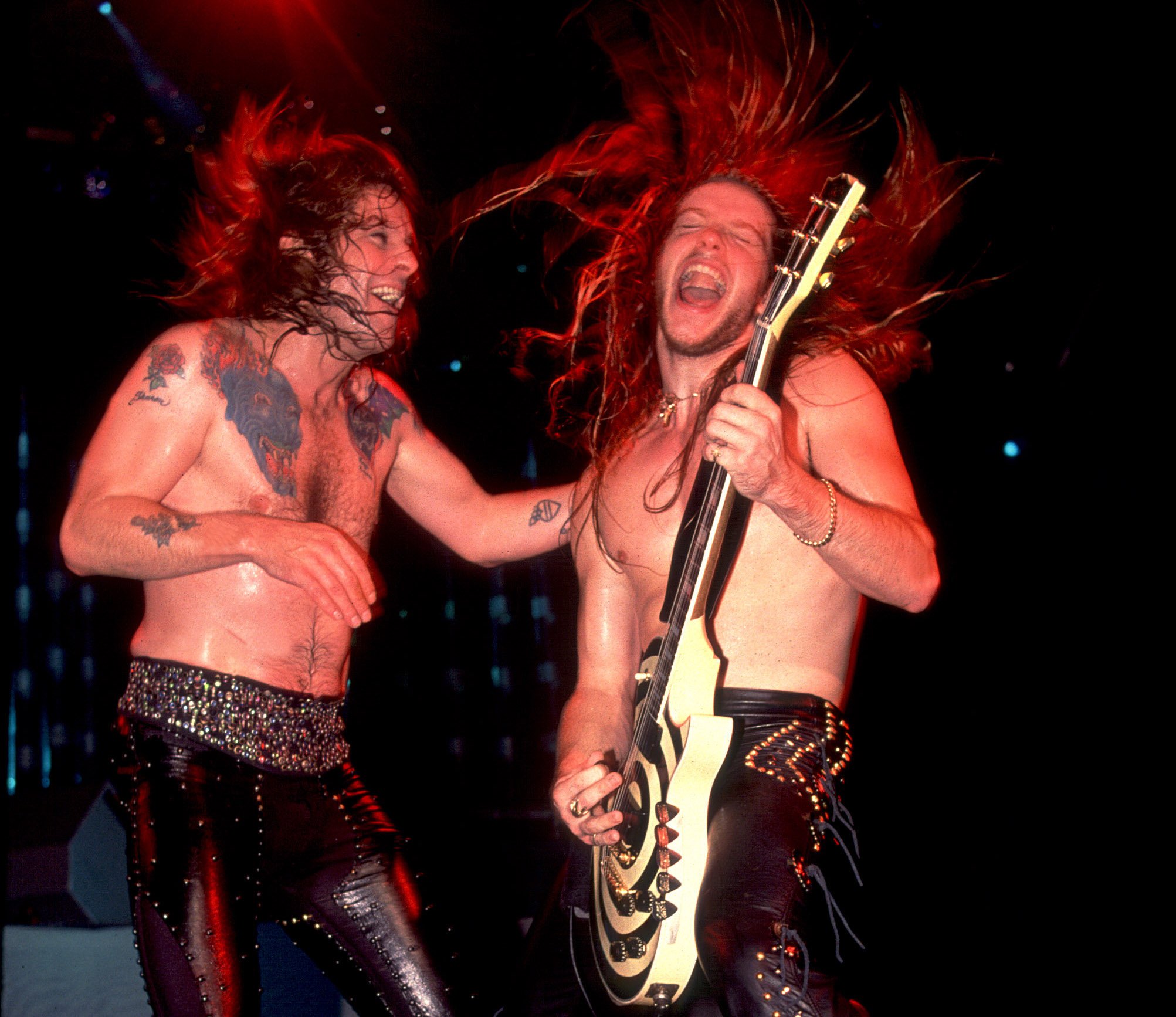
New Jersey-area players Dave DiPietro of TT Quick and Ken Dubman of Prophet also played important roles in Wylde's development.
“I was never able to play with phrasing until I saw Dave and Kenny play,” he notes. “I used to wail out on total diatonic scales, but they were playing blues licks.
“When you're playing blues, you're not actually playing scales. You're bending and phrasing notes, jumping strings – much closer to how a singer sings. I mostly played scales up until the time I saw those guys play. I'd much rather wail out to some Di Meola stuff than anything else.
“Jimmy Page's Heartbreaker lick was one of the few blues licks I liked playing. John McLaughlin played pentatonics too, and he'd play 'em a million miles an hour.”
Before long, Wylde himself started to give lessons.
“I was charging only ten bucks an hour,” he remembers. “I was making more money doing construction, but I almost fell off a roof a few times; I said, ‘The hell with this,’ and got into teaching guitar. I was saving all my money to buy Les Pauls. I was such a pennypincher, I didn't even treat myself to McDonald's. Teaching guitar certainly wasn't going to make me as rich as Hugh Hefner.
“At one point I had close to forty students. Some of them got to be really good players. I'd show 'em something and three weeks later they'd come back playing almost as good as John McLaughlin!
“Most of the other students liked playing guitar just for the fun of it; they didn't have the hunger that's needed to play really well. When I told them I was auditioning for Ozzy, they were all happy for me. They knew I could play every Black Sabbath and Ozzy lick upside down and backwards.”
I would love to play more classical stuff with Ozzy, but it would be stupid for me to do something that Randy was such a master at
Of the three pivotal guitarists to have played with Osbourne during the past twenty years – Tony Iommi, Randy Rhoads, and Jake E. Lee – Wylde's style falls somewhere between Iommi's rhythmic attack and Rhoads' carefully structured, often maniacally melodic, playing.
“Iommi was the master of the riff,” says Wylde. “He never puts in many fills, and neither do I. Since I've always been a massive Black Sabbath fanatic, he's had a huge influence on my playing.
“Randy was ahead of his time,” Wylde continues. “He was the first guy to do the all-out classical trip in a metal band. I've been told that my playing is reminiscent of Randy's, but the main similarities between us are that we both favor Les Pauls and we're both blonde-haired. I would love to play more classical stuff with Ozzy, but it would be stupid for me to do something that Randy was such a master at. And besides, Ozzy hired me because he wanted me to be different.
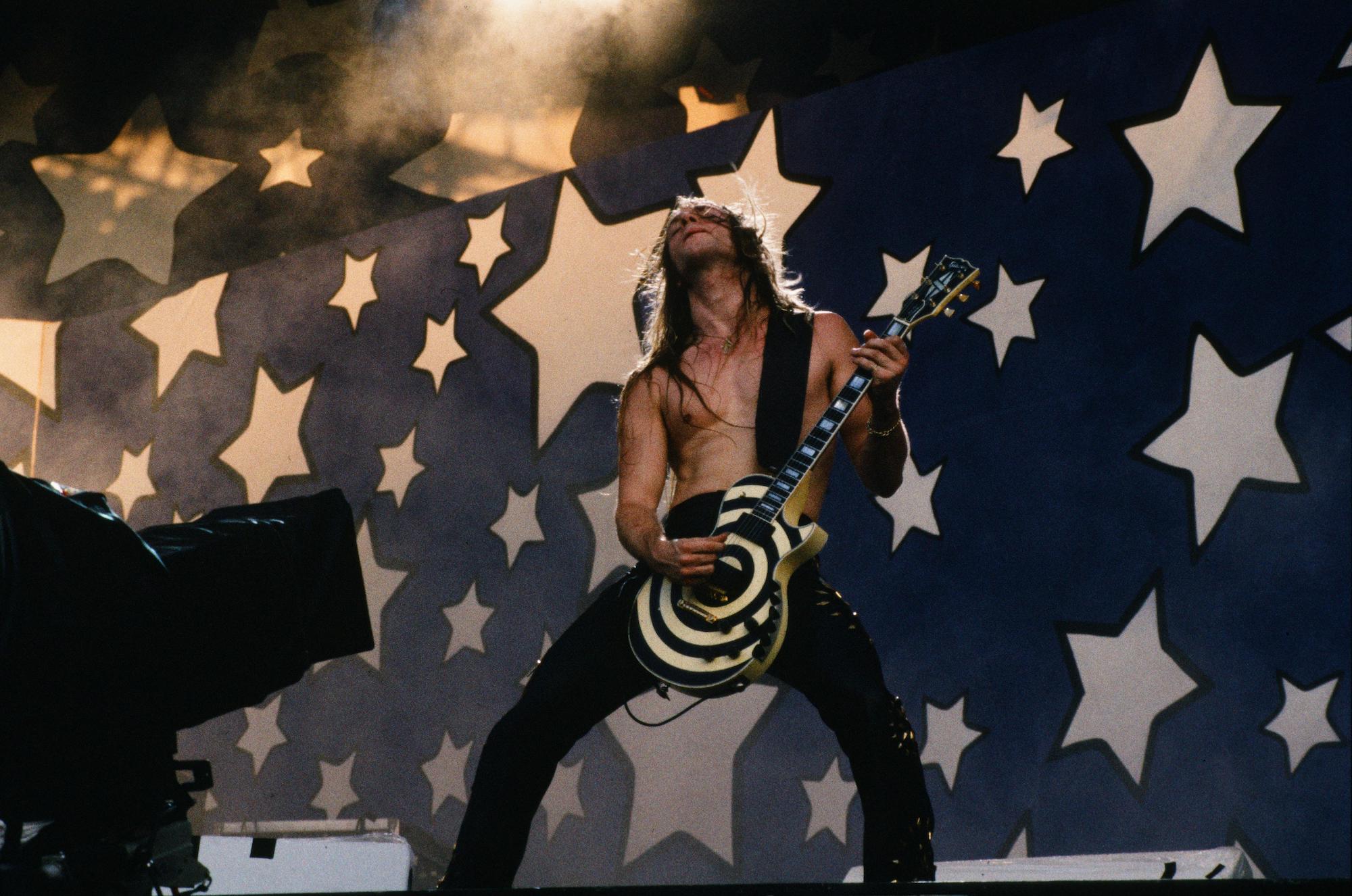
“When I joined the band, Ozzy told me I'd often hear people scream out Randy's name during a show, but it hasn't happened yet. Even if they did, it wouldn't piss me off because I love Randy as much as everyone else. What's really surprising is that I've seen a lot of handmade ‘Zakk’ T-shirts around. The fans have been real supportive.”
In any event, Wylde's style is closer to Rhoads' than Lee's ever was.
“Jake has great vibrato and picking technique,” says Wylde. “I enjoy listening to his playing. When we play the songs that Ozzy did with Jake, like Bark At The Moon and Shout At The Devil, I try to play the guitar parts exactly as Jake played them. If Jake were to come to one of our shows, he wouldn't laugh at me.”
Like Lee, Wylde doesn't use a vibrato bar.
“I can't play it properly,” he says bluntly. “It would take me too long to come up with something that no one else is doing. Guys like Steve Vai and Brad Gillis can play 'em really well and do some nice musical tricks. I don't bother embarrassing myself, so I don't use em.”
He doesn't tap, either, though he'll sometimes bend the G string around the seventh fret and then tap the highest note on the neck.
“I don't do any wild tricks, like Van Halen does. I know a few of his solos, and sometimes I'll play 'em if I'm just fooling around.
“Vito Bratta is the only guitarist I've heard who sounds cool doing taps,” Wylde maintains. “I know he often gets compared to Van Halen, but he really isn't like him too much. Vito's solo on [White Lion's] Wait is excellent and doesn't sound like Eddie at all.
“Reb Beach does a lot of taps, too. But it sounds more like he's doing scales, and that's what blew me away when I jammed with him. I remember Reb telling me, ‘I hope no one tells me that I'm like Eddie.’ I'd go out and watch Reb's solo when Winger opened some shows for us. He's a good, fluid player.”
What other new players does Wylde like? “Ronni Le Tekro [of TNT] is probably my favorite,” he replies. “I could listen to a whole album of his and not get bored. His picking wails, and he doesn't sound like Yngwie – just a real fierce attack. He does some serious smokin', for sure.
“Slash also kicks butt. He just laughs at all the Yngwie clones, like I do. Slash doesn't sound like anyone else. And when you listen to Guns N' Roses, you don't get tons of guitar shoved at you – just great songs, and a fresh sound with a lot of attitude. I think guitar playing is going back to the blues now. Too many people are tired of super-fast classical licks. It's overkill.”
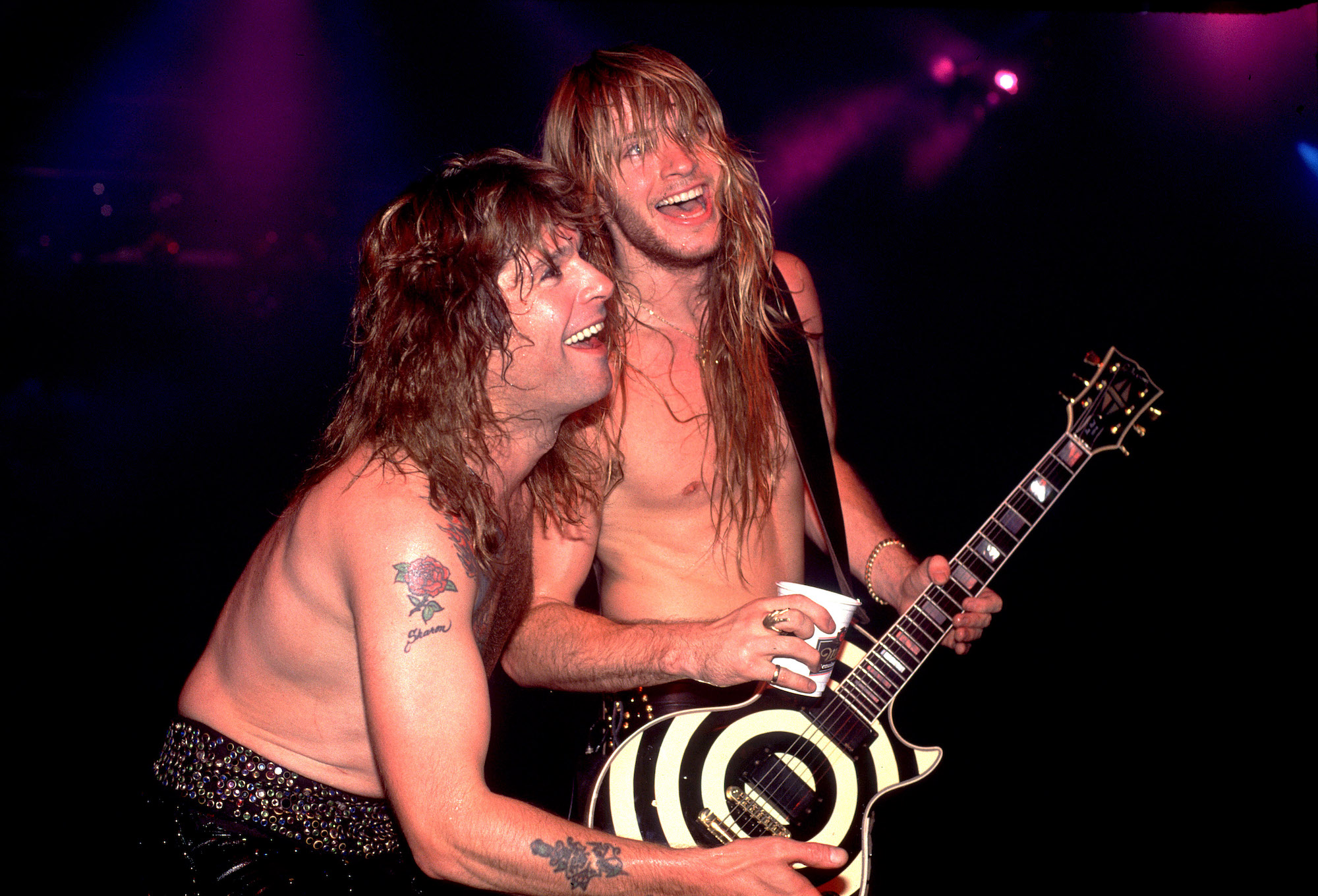
Wylde's favorite guitar is a bull's-eye-decorated Les Paul with EMG pickups, the only ax he used for No Rest For The Wicked.
“Les Pauls have balls,” says Wylde. “I traded this guy, Scott Quinn, a white doubleneck and a black Les Paul Custom for the guitar. Scott was working with [amp hot-rodder] Lee Jackson at the time. I played the guitar through the system Lee built for me and really liked it. I only used the back pickup on the album. Ozzy hates the sound of the front pickup. He calls it the ‘cow tone.’”
In the studio, Wylde used two Metaltronix 100-watt heads and few effects – a Boss Super Overdrive and a CryBaby wah, for the most part.
“Metaltronix have more clarity than the other amps I've tried,” says Wylde. “If people don't like my tone, they should plug their guitar into one of Lee's amps.”
Wylde's Jackson-built rig has “a load of effects,” he says, “but onstage I use primarily a Simmons mixer, one of Lee's Perfect Connection GP-1000 preamps, and a Yamaha SPX90 for clean sounds.”
Despite his big break, Wylde's head remains unswollen.
“Ego-tripping is for jerks,” he says. “I hate posers and people who think they're rock stars. It's not a big deal just because you're in a rock band. When my friends came to see me play at the Meadowlands [in New Jersey], they saw me onstage. It was the same guy they've been hanging out with for years. They said it didn't really seem like it was an Ozzy concert to them.
“I'm not bigger than life now: I still practice guitar all day long. I'd often read about guys in guitar magazines who say how they don't have time to practice on the road, but it's not true.”
Wylde has this advice for aspiring players: “Try to find a guitarist in your neighborhood who'll teach you what you really want to play. If you're forced to play what you don't want, it'll turn you off. You need someone who won't get too heavy on you at first – just some chromatic scales and finger exercises. Once you learn some songs, you won't mind playing scales to improve. I started out by playing all the early Black Sabbath songs, and then took it from there.”
With original Black Sabbath bassist Geezer Butler now in Ozzy's lineup, Wylde is truly living his rock 'n' roll dream.
“It's the absolute best band I could ever wish to be in,” he states. “Every show we're in stitches because sooner or later someone will do something corny. Sometimes Ozzy'll do his Pete Townshend leaps while Geezer does some Arabian dance in the corner of the stage. It's hilarious, and we all get along great.”
Does the veteran Geezer offer young Zakk any words of wisdom? “Yeah, he tells me not to catch herpes,” laughs the guitarist. And, more seriously, “he knows I'm capable of playing more interesting things in the studio. That's exactly what I plan to do. The Zakk Attack won't be held back.”
This interview with Zakk Wylde was originally published in the June 1989 issue of Guitar World.


